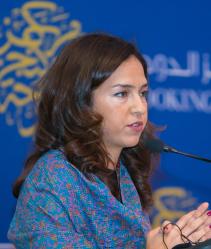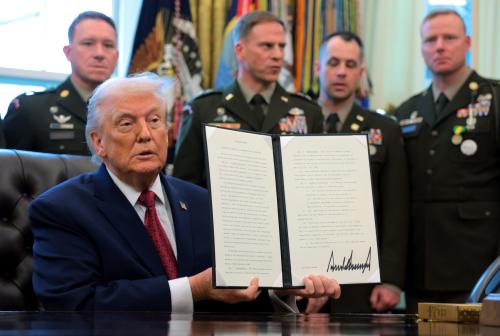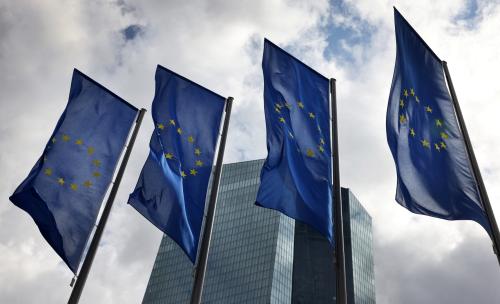Content from the Brookings Doha Center is now archived. In September 2021, after 14 years of impactful partnership, Brookings and the Brookings Doha Center announced that they were ending their affiliation. The Brookings Doha Center is now the Middle East Council on Global Affairs, a separate public policy institution based in Qatar.
The novel coronavirus was first identified in January 2020, having caused people to become ill in Wuhan, China. Since then, it has rapidly spread across the world, causing widespread fear and uncertainty. At the time of writing, close to 500,000 cases and 20,000 deaths had been confirmed globally; these numbers continue to rise at an alarming rate.
Already, the Middle East and North Africa (MENA) region has been hard hit, with Iran emerging as an early global epicenter. As the pandemic continues to spread across the region, governments are taking increasingly dramatic steps to stem its progress, including forbidding public gatherings, imposing curfews, banning flights, and enacting surveillance measures.
With the coronavirus crisis evolving at a breakneck pace, Brookings scholars look forward, sharing their thoughts on what are likely to be the key implications of the pandemic for the MENA region. In the following outlooks, the scholars outline critical regional challenges, touching on political, economic, security, and social issues. Though many facets of the pandemic remain unknown, these outlooks offer important insights into the impact that the coronavirus has already had on the region, as well as implications of what is yet to come.
Tarik Yousef – COVID-19 could lead to macroeconomic instability and public unrest
The economic performance of Middle Eastern economies was expected to improve in 2020, following a period of anemic growth due to a combination of lower and volatile oil prices, a global economic slowdown, and regional geopolitical tensions. To be sure, the projected recovery was modest and the public finances of most countries remained vulnerable to external shocks. The past two years also saw the return of mass protests across the region as the public responded to decreasing economic security and deteriorating social protection systems.
As such, it is hard to exaggerate the potentially devastating impact of the “one-two punch” delivered by the growing coronavirus pandemic and the spectacular collapse of oil prices. Dramatic falls in foreign exchange revenues have already hit fiscal balances and will constrain the ability of most governments to respond with the financial measures needed to mitigate the pandemic’s crippling effects on domestic economic activity. Domestic borrowing cannot fill the widening fiscal gaps; international borrowing, following years of rising sovereign debt, will come at a much higher cost and create risks down the line.
Most worrying is the impact of these conditions on economic livelihoods, especially among the poor and the working classes, given the already strained safety nets. With little to no savings, no unemployment insurance, and reduced food subsidies, large segments of the population that engage in subsistence or informal work to support their families cannot endure sustained lockdowns or interruption to their livelihoods. Unskilled imported labor in oil-exporting countries will not be immune to severe economic dislocation either. It is also not clear whether most governments have the capacity to respond to mounting pressures on health systems and food distribution channels.
As a result, the longer the economic disruption caused by the coronavirus pandemic and the greater the pressures on the region’s constrained governments to respond, the higher the likelihood of deepening macroeconomic instability and the reemergence of widespread public unrest in 2020.
Ranj Alaaldin – COVID-19 could become a conflict-multiplier across the MENA region
The COVID-19 pandemic could further strain public services, dilapidate already neglected public health infrastructure, and revive geopolitical rivalries across the MENA region. It may also undermine the legitimacy of ruling elites while eroding social capital in societies that have already succumbed to socio-economic, political, and ethno-sectarian divides. If an immediate and expansive containment strategy is not implemented, the pandemic could be the worst crisis to hit the MENA region since the Islamic State emerged in 2014, with similarly catastrophic implications across national borders.
Yet, it seems possible that containment strategies will be up-ended by other political and socio-economic challenges facing the region, which have already pushed its countries and citizenry to the precipice. Iraq, for instance, is on the brink of a socio-economic implosion because of its youth bulge, economic degradation, and battered infrastructure. It also faces a protest movement that has plunged the country into an existential crisis. Syria continues to be engulfed by a civil war, which has shattered formal governing structures, displaced millions, and killed hundreds of thousands. Lebanon, meanwhile, is on the brink of bankruptcy, facing high levels of political and social instability.
It is in conflict-stricken countries where the impact of the pandemic will be the most acute. Aside from the weaponization of the crisis by elites, militias, and external powers engaged in proxy wars, the pandemic could further devastate communities and populations that have been neglected by the international community and lack the resources to stave off the virus’ potentially devastating impacts. Camps for internally displaced persons (IDPs) are the most vulnerable, in large part because tens of thousands live in squalid conditions in over-crowded areas. Even prior to the current pandemic, host countries were overstretched and unable to meet the camps’ urgent humanitarian needs.
In other words, COVID-19 will almost certainly become a conflict-multiplier across the region if it is not contained. As has been the case for many years now with respect to existing conflicts and crises, the pandemic’s fallout will not remain confined to the region if an international response is not forthcoming.
Geneive Abdo – The coronavirus will further destabilize the Iranian regime
President Hassan Rouhani recently suggested that Iran will begin easing by the beginning of April the restrictions put into place to contain the coronavirus. On the surface, this seems like puzzling news.
Iran is the epicenter of the MENA region’s outbreak of the disease, and home to one of the highest mortality rates worldwide. As of writing, Iran has reported more than 23,000 cases and more than 1,800 deaths. Since the coronavirus officially landed in the holy Shiite city of Qom in mid-February, several government officials, including the deputy health minister, have contracted the disease and some have died. The government has been ill-prepared to handle the spread of the disease due to the effects of U.S. sanctions, Iran’s outdated health system, and the public’s lack of trust in government edicts.
But Rouhani’s suggestion, although it might defy conventional wisdom, makes sense in the Iranian context. The coronavirus restrictions are but one more item added to the lengthy list of Iranians’ grievances. Nationwide protests have taken place on and off since 2017, challenging government authority and increasingly threatening regime stability. Protesters have complained of government corruption leading to inadequate public services, lack of jobs, and pollution.
Rouhani and Foreign Minister Mohammed Javad Zarif claim that U.S. sanctions are the primary reason for the government’s difficulty in containing the virus. However, Iranian society is likely to think otherwise. There are reports that the government initially tried to cover up the virus outbreak, as well as media criticism outside Iran that the government is not doing enough to contain the virus. The government, and especially its hardline factions, seems less concerned with containing the virus than with preserving the strength of the regime.
Although the virus threatens regime stability, Iran’s military maneuvers in the wider MENA region and, in particular, its attacks inside Iraq, go on as usual. Relations with the United States also remain unchanged. Just this month, Iranian-backed Shiite militias inside Iraq attacked U.S.-led coalition bases.
If these trends are any indication, Iran’s near future is likely to be “business as usual,” with no policy changes either at home or in the region. But in the end, if the virus leads to more domestic unrest, it may damage the regime even more than U.S. sanctions.
Ali Fathollah-Nejad – The coronavirus underscores “new patterns of dependency” in Iran
With Iran having emerged as the Middle Eastern epicenter of the coronavirus pandemic, the outbreak and spread of the virus cannot be disassociated from political and geopolitical factors.
As was the case in China, authorities in Iran concealed the outbreak of the novel virus for several weeks, with Tehran only announcing the first infections and deaths in the second half of February. The regime did not want to disclose the outbreak because it wanted to mobilize the masses for both the anniversary of the Islamic Revolution and the parliamentary elections that took place earlier that month.
The “China link” seems to be at the core of the outbreak in Iran. When the first virus cases were reported in China and the World Health Organization (WHO) declared a “public health emergency” in late January, Iran, like other countries, announced a ban on China flights. However, during the first three weeks after the ban, one major Iranian airline, Mahan Air, continued operating flights as scheduled, after its CEO reportedly met with the Chinese ambassador in Tehran.
This China connection is a prime example of what I have termed the “new patterns of dependency” that Iran will experience vis-à-vis Eastern great powers such as China and Russia as it seeks to counter Western pressures. Thus, voluntarily or as a sign of anticipatory obedience, Iran maintained its China travel links. In other words, Iranian authorities have prioritized political interests over duly informing the public about the spread of the virus and taking adequate precautions.
Such government deception and mishandling of the crisis has complicated authorities’ efforts at containing the virus, as the population routinely distrusts measures and information announced by the regime. Meanwhile, the economic toll on an already ailing economy promises to be devastating. Both domestic consumption and regional trade – keys to bolstering an economy suffering from sanctions – have been heavily affected.
Omar Rahman – COVID-19 could reinforce anti-democratic slides in Israel-Palestine
In Israel-Palestine, as elsewhere, events are moving quickly and circumstances are rapidly changing. Despite their mutual enmity, the Israeli government and Palestinian Authority (PA) have extended their security cooperation to the management of the COVID-19 crisis, with the usual occupier-occupied power dynamics still in play. Although the PA is ostensibly working with Israel, the latter has implemented a lockdown of Palestinian cities and towns at its own discretion.
Fiscal repercussions will likely be severe, especially for Palestine’s far more vulnerable economy. The pandemic is sure to test the Palestinians’ already inadequate healthcare system — and if it spreads to the Gaza Strip, it could be absolutely devastating. In Israel, too, the healthcare system is one of the most neglected sectors of the country, and the spread of the virus could prove overwhelming.
The political implications for both societies are fluid and uncertain. In the midst of rough political waters prior to the pandemic, leaders of both Israel and Palestine may find a silver lining in the crisis for themselves.
Facing criminal indictments and a gridlocked political system, Israeli Prime Minister Benjamin Netanyahu and his surrogates have declared a state of emergency, overseen the suspension of Knesset meetings and the court system, delayed the start of his criminal trial, and appropriated the country’s surveillance technology for use without parliamentary oversight. Now, Netanyahu looks set to pressure the political opposition into forming a unity government with himself at the helm.
For PA President Mahmoud Abbas, who has also declared a state of emergency, the crisis has provided an opportunity to showcase his leadership at a time when his legitimacy and that of the PA are being seriously questioned. It has also provided Abbas a reprieve from pressing issues such as Trump’s “Deal of the Century” and the need for elections, which he keeps promising and failing to deliver. Yet, with public trust at an all-time low, PA officials have also had to reassure society that the tough actions used to stem the pandemic are not politically motivated, especially after they arrested a prominent critic immediately following the emergency measures.
An extended period of crisis could reinforce the anti-democratic slides that are already underway in both Israel and Palestine.
Yasmina Abouzzohour – The coronavirus will have wide-reaching impacts in the Maghreb
As Libya takes steps to avoid a coronavirus outbreak, other Maghreb leaders are adopting drastic measures to reign in the pandemic’s progress. These measures include banning public gatherings, imposing mandatory confinement, canceling classes, closing mosques, partially demobilizing the workforce, and suspending air, sea, and land travel.
Some of these measures will have severe economic impacts across the Maghreb. Morocco and Tunisia, whose economies rely on tourism, will struggle as travel restrictions persist. Hydrocarbon-exporting Algeria and Libya will suffer as oil prices drop. Disruptions to trade with China will negatively impact Morocco, Algeria, and Tunisia, while slumping European markets will hurt Morocco, Europe’s largest trade partner in the Mediterranean.
On the political front, although the pandemic may provide a period of respite from regular protests in Algeria, regime behavior during this time, along with mediocre healthcare systems and social inequality, will eventually lead to dissent across the Maghreb. In Morocco, where the government’s response was mostly applauded, the decision to close mosques triggered criticism from notable Salafist figure Abdelhamid Abou Naïm, while the general lockdown led dozens of people to demonstrate in Tangier, Fes, and Tetouan. Authorities have since arrested Abou Naïm, who is currently awaiting trial, as well as a group of people accused of inciting the protests. Videos and images of security forces violently repressing individuals who challenged the lockdown have circulated widely on social media. This violence will be criticized by human rights activists and groups, which recently accused the regime of judicial repression.
In Algeria, members of the peaceful, anti-regime Hirak movement have postponed protests for the first time since February 2019. The movement’s decision to delay protests for the greater good will earn it respect and trust within the population. The ongoing crisis will also be a test for President Abdelmadjid Tebboune, whose election to office was widely boycotted and whose reaction to the pandemic will be scrutinized.
Tunisia has a better healthcare system than Morocco and Algeria and is dealing with a slower progression of the virus. In addition to $400 million it received from the International Monetary Fund (IMF), the government has pledged $850 million to help contain the virus’ impact. However, the country’s economic outlook is bleak and a recession is likely, especially with the pandemic’s impact on its tourism sector.
Despite having only one confirmed case at the time of writing, Libya is also a source of concern, given its ongoing conflict; should an outbreak occur, the consequences will be catastrophic, due to its limited resources and the internationally recognized government’s lack of control over the country.
Galip Dalay – COVID-19 will magnify the Turkish economy’s vulnerabilities
COVID-19 is already reshaping socio-economic life in Turkey. While the Turkish public largely views the government as having handled the crisis relatively well, the numbers of diagnosed cases and deaths are growing exponentially. In response, the government has taken drastic measures, including announcing a 100 billion-lira ($15.4 billion) stimulus package; closing bars, gyms, and nightclubs; suspending Friday prayers; imposing a curfew; and banning flights to and from 68 countries.
These measures, coupled with the global impacts of the pandemic, are taking a heavy economic toll on Turkey. Even more ominously, this pandemic occurred at a time when the Turkish economy was already suffering from a high budget deficit, a fragile financial system, and the central bank’s low level of foreign exchange reserves. First hit by the Idlib crisis, the Turkish lira is now losing further value vis-à-vis other major currencies, particularly the U.S. dollar. Last week, it hit its weakest level since September 2018.
Some of the sectors most affected by the pandemic will be tourism, retail, transportation, and aviation. In 2019 alone, Turkey hosted almost 52 million tourists, becoming the sixth most visited country in the world. Because tourism has been one of the major revenue sources for Turkey’s cash-starved economy, the pandemic’s impact on this sector is a particularly worrisome development.
In a similar vein, Turkey’s transportation and aviation industry looks set to face major challenges. In 2019, national flag carrier Turkish Airlines saw a net profit of $788 million and an occupancy rate of around 81 percent. The carrier will suffer heavy losses in the coming months and is planning to cancel almost all of its flights by March 27, excluding those from Istanbul to five major destinations.
Previously, the Turkish government forecasted that the economy would grow by 5 percent in 2020. Now, it seems that the Turkish economy will see a very meager growth rate or even contraction this year. To what extent Turkey’s economic vulnerabilities and woes will cost the government politically will depend on the longevity of the crisis, as well as the severity of its death tolls and economic impacts.
Nader Kabbani – GCC discord could exacerbate the pandemic’s economic fallout
Gulf Cooperation Council (GCC) countries have done remarkably well in containing the coronavirus outbreak. Their actions were preemptive, within reason, and well communicated. GCC countries began by canceling major events and limiting visitors from hotspot countries. Then, they progressively limited public gatherings, closed schools, restricted travel, and shut down restaurants and non-critical businesses, preventing panic by providing regular updates to citizens and residents. They introduced clear testing and quarantine procedures, ensured that basic services continued, and provided assurances that food warehouses were well-stocked. Finally, GCC governments announced economic stimulus packages totaling $97 billion to assuage investor fears and help the private sector absorb the shock of the crisis.
Even so, GCC countries will face several critical challenges in the coming months. First, like everywhere else, the GCC will experience a downturn in economic activity due to the outbreak; however, the corresponding fall in global oil prices will hit its economies especially hard. Second, the outbreak has accentuated structural weaknesses in GCC labor systems, including difficulties ensuring the rights of migrant workers and providing adequate support to overcrowded, underserved accommodation camps. Finally, at a time when close coordination and cooperation between countries is urgently needed, geopolitical gamesmanship continues to undermine the GCC region and the best interests of its member states. Saudi Arabia’s decision to increase oil production during a glut is a case in point.
GCC countries must undertake a number of policy measures to address these issues. First, they need to ensure that their stimulus packages are used effectively. This means extending credit to small and medium enterprises, rather than trying to prop up specific sectors or volatile stock markets. Second, they must continue to manage the aftermath of the crisis effectively. This will involve maintaining public services and supporting economic activity by expediting government payments to firms and mandating that firms pay workers’ salaries on time. Third, GCC countries need to overcome internal discord and work together to confront the economic challenges posed both by the pandemic and the resulting decline in oil prices; there is little time to waste.
Adel Abdel Ghafar – The coronavirus will force Gulf airlines to face hard realities
As the fallout from the coronavirus continues to decimate the airline industry, the three largest Gulf carriers – Emirates, Etihad Airways, and Qatar Airways – are likely to suffer. To date, the Middle East Three (ME3) have been able to win over customers with newer aircraft, better service, and competitive fares. However, the ME3 have also faced serious challenges in recent years. Abu Dhabi’s Etihad has been struggling financially, leading it to lay off pilots and cancel aircraft orders. Dubai’s Emirates is in better shape, but posted lower profits in the 2018/19 fiscal year, while Dubai’s airport saw passenger numbers fall in 2019. Qatar Airways has been suffering since 2017 due to the blockade imposed by its neighbors, posting a loss of $640 million after tax for the 2018/19 fiscal year.
The coronavirus is set to exacerbate all of these problems. Etihad has already canceled a large number of flights and asked staff to bring forward paid annual leave. Emirates has also asked staff to take leave, and expects a big impact on its financial performance. Qatar Airways has begun laying off staff. All three airlines grounded a majority of their aircraft this week.
As the three state-owned airlines are prestigious national symbols, their governments will likely come to their aid. Etihad is the most vulnerable of the ME3, having recently accumulated losses of $4.8 billion over a three-year period and conducted a series of bad investments. Given these pressures, the coronavirus may galvanize Abu Dhabi and Dubai to carry out a long-rumored Etihad-Emirates merger. Meanwhile, Qatar Airways may have to scale back its ambitious aircraft orders, reportedly worth an astronomical $90 billion.
Coronavirus is not the first challenge to face the ME3, and it will not be the last. In the long term, new aircraft with extended long-haul capabilities will challenge the ME3’s hub-and-spoke model. More pressingly, lower oil prices have already begun to have a negative impact on GCC economies, which will push Gulf policymakers to carefully reassess their spending, including on airline subsidies. Overall, while the ME3 are likely to fare better in the coronavirus crisis than other global airlines, they will eventually have to adjust to the hard realities of the aviation industry.
Noha Aboueldahab – Governments will exploit the pandemic to entrench authoritarian rule
The coronavirus pandemic has served as yet another pretext for curbing human rights. Governments around the world are using their emergency powers to put in place exceptional restrictions to keep the virus contained. Their approach is reminiscent of the swift and repressive measures they previously took to enforce so-called counterterrorism policies.
Recent responses to the coronavirus include mass surveillance measures that track the movements and contacts of those infected with the virus. China has already ramped up its use of facial recognition technology to this end, while Israel is now using digital technology to extract the mobile phone data of infected and potentially infected individuals. Despite these intrusive measures, governments are failing to act in other ways that are crucial to slowing the spread of the virus, such as by releasing prisoners.
With the impossibility of social distancing in crowded and unhygienic prisons, many have been calling for the conditional release of as many prisoners as possible in an effort to limit the spread of the coronavirus. In some countries, those calling for the release of prisoners are being arbitrarily detained. Recently, four Egyptian women who staged a small protest outside the Egyptian cabinet were arrested for this very reason. Meanwhile, Iran has released 85,000 prisoners in an effort to stem the spread of the virus.
Syria’s estimated 90,000 detainees are also at high risk of suffering the worst of the pandemic, especially given the already dire conditions under which they are held, in contravention of international law. Petitions to the international community to exert pressure on the Syrian regime to release detainees have yet to generate an adequate response.
With thousands of prisoners of conscience across the Middle East, calls for their release are very political and highly risky. Many of these prisoners were arbitrarily detained under the bogus pretext of repressive counterterrorism laws that saw a surge after the 9/11 attacks. Prisoners and their families are still reeling from the effects of these politicized laws.
The emergency powers invoked by governments to inflict further repression, rather than genuinely control the spread of the coronavirus pandemic, point to the use and abuse of public health crises to entrench authoritarian rule. Once the pandemic subsides, lawyers and policymakers wishing to reverse these restrictions will have their work cut out for them.
The Brookings Institution is committed to quality, independence, and impact.
We are supported by a diverse array of funders. In line with our values and policies, each Brookings publication represents the sole views of its author(s).











Commentary
Op-edBrookings experts on the implications of COVID-19 for the Middle East and North Africa
March 26, 2020